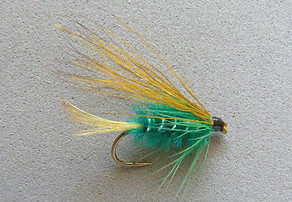

T C IVENS
PIONEER ENGLISH RESERVOIR FLY FISHERMAN (1921-1988)

T C IVENS' ORIGINAL SERIES OF FLY PATTERNS
Tom Ivens' original series of flies, first published in the first edition of Stillwater Fly-Fishing, are undoubtedly the best known and most widely used of his patterns.
The flies are all reasonably straightforward in construction and should pose no problem for a fly tyer of only modest skills. The intention was that they should all be dissimilar in profile. Several patterns are still in common use today and are still listed in fly catalogues.
Ivens listed odd numbered hook sizes, although they are unavailable nowadays, and it is left to the fly dresser to use their judgement when it comes to choosing an appropriate hook size.
Black & Peacock Spider
Hook: Wet fly hook sizes 6 – 12
Most useful sizes: 8 – 9
Tying thread: Black
Body: Bronze peacock herl over floss underbody, ribbed with tying thread for strength
Hackle: Long fibred black hen collar hackle
Head: Tying thread, clear varnished
Variants: Tandem and streamer versions can be tied, see the comments below.

Brown & Green Nymph
Hook: Wet fly hook sizes 6 – 10
Tying thread: Black
Tail: Peacock herl
Body: Green-dyed and brown-dyed ostrich herl wound together to form segmented body, ribbed with oval gold tinsel
Back: peacock herl
Head: Peacock herl twisted and wound to form bold head.
Variant: Tie with a leaded underbody

Green Nymph
Hook: Wet fly hook sizes 7 – 12
Most useful sizes: 9 –10
Tying thread: Black
Body: Tapered white floss underbody over-wrapped with green-dyed nylon monofilament
Hackle: Brown partridge collar hackle
Head: Peacock herl twisted and wound to form bold head
Variant: The partridge hackle can be omitted in very small sizes

Brown Nymph
Hook: Wet fly hook sizes 7 – 12
Most useful sizes: 9 –10
Tying thread: Black
Back: Two strands of stripped green-dyed ostrich herl
Body: Brown-dyed ostrich herl, ribbed with oval gold tinsel
Horns; Two strands of peacock herl
Head: Peacock herl twisted and wound to form a bold head
Variants: This pattern can be simplified in sizes 12 and smaller by omitting the ostrich quill and substituting brown wool for the body

Green & Yellow Nymph
Hook: Wet fly hook sizes 10 – 12
Most useful sizes: 11 – 12
Tying thread: Black
Body: Rear half of body green-dyed swan herl, front half of body deep yellow-dyed swan herl
Head: Peacock herl twisted and wound to form a head

Pretty Pretty
Hook: Wet fly hook sizes 6 – 9
Most useful size: 7
Tying thread: Black
Tag: Silver tinsel
Tail: Golden pheasant topping feather
Body: Floss underbody, over-wrapped with peacock herl and green-dyed ostrich herl twisted together, ribbed with oval silver tinsel
Hackle: Green-dyed hen collar hackle, two turns
Wing: Goat hair dyed orange-yellow
Head: Tying thread, clear varnished

Jersey Herd
Hook: Long shank lure hook size 6
Tying thread: Black
Tail: Twelve strands peacock herl
Body: Floss underbody tied to a fish profile, over-wrapped with copper coloured tinsel
Back: Peacock herl
Hackle: Short-fibred rich orange cock collar hackle (doubled), two turns
Head: Peacock herl twisted and wound to form bold head
Variant: It may be tied with a leaded underbody

Alexandra
Hook: Wet fly hook sizes 6 - 11
Tying thread: Black
Tail: Red Ibis (substitute)
Body: Silver tinsel, ribbed with oval silver tinsel
Hackle: Black hen throat hackle
Wing: Green peacock sword tail fibres
Topping: Golden X Amherst topping feather
Head: Tying Thread, clear varnished

Tying instructions together with suggestions of when and how to fish the flies are detailed in The Fly Fishing Legacy of T C Ivens (Welford Court Press) to be published in late-2021.